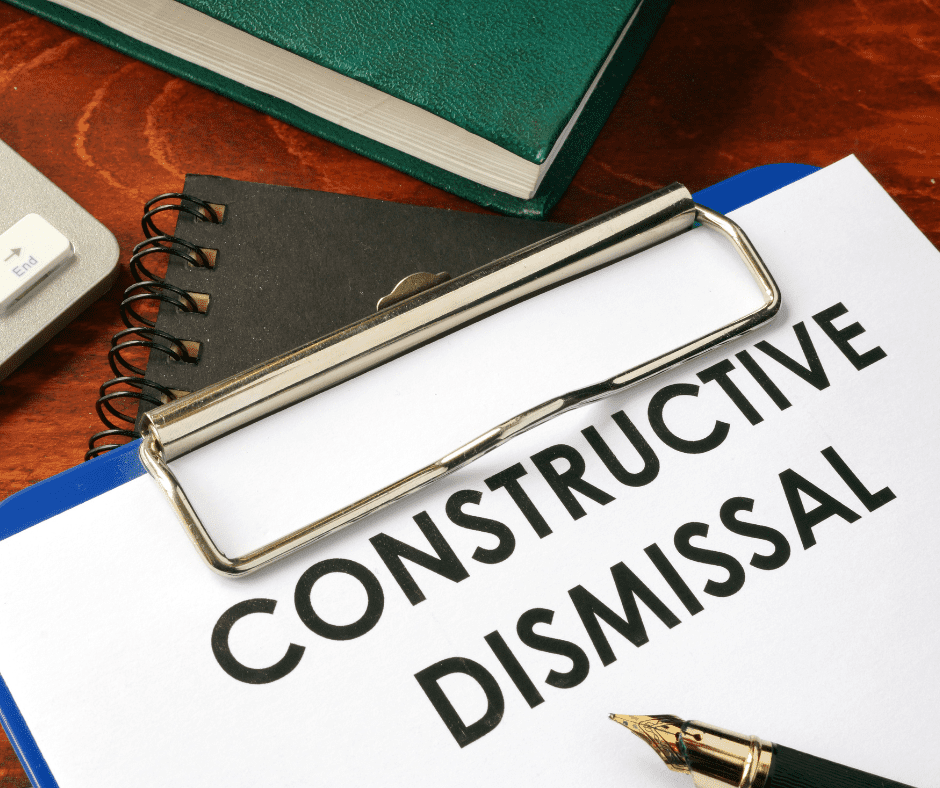
When getting into a new job, you have entered into it in good faith and you don’t think about constructive dismissal. Your workplace should be a space that you enjoy. You should not feel helpless when you’re there. If you feel forced to leave your job because of a hostile environment, it’s possible that constructive dismissal has occurred. Please read on.
What Is Constructive Dismissal?
Constructive dismissal happens when an employee feels they have no choice but to leave a workplace due to changes in the terms of the employment. In order to consider termination as a constructive dismissal, the changes to your contract have to be made at the heart of the contract. An employer is allowed to change the duties and responsibilities of an employee as they see fit. This isn’t considered grounds of constructive dismissal.
Constructive Dismissal In Ontario
If you feel that there has been a substantial alteration to the terms and conditions of your employment or to your employment relationship or your workplace has become a toxic work environment, you may have been constructively dismissed. Here are some options laid out in by the Ontario Court of Appeal in a[1] court case in 2008:
- Accept the changes. The acceptance of these changes can be outlined through implicit insinuation, or through explicit clearcut demeanour.
- Period of time before bringing attention to your situation can become a hurdle if seeking remedy for constructive dismissal.
- If the changes in your contract make it impossible to work and leave you feeling helpless, then you can end your employment, claiming constructive dismissal as the reason. This comes with many risks and no guarantees.
- In some instances, you can let your employer know that you do not accept the changes made to your employment contract. This demonstrates an intention to no longer be bound by the employment contract
- This can occur if changes are made to your constructive dismissal compensation. In this case, if an employer fails to respond then they will be found to have implicitly accepted the employee’s argument.
You may be forced to return to work in order to mitigate damages that negatively alters the employment relationship. Although this may seem counterintuitive, seeking re-employment is beneficial if considering legal action against your employer. The courts will look over many factors in your case. Such as:
- Would a reasonable person accept re-employment?
- Is it humiliating for an employee to stay under certain conditions?
- Does the employee have to remain in a miserable and bitter workplace?
However, before doing anything make sure you seek legal consultation. Seeking legal employment counsel will allow you to see your options, and know your rights moving forward.

Hostile, Toxic Work Environment
Having your employment contract changed can create hostility. It can cause distrust between you and your employer, especially when these changes leave you feeling helpless. This alters the employment relationship. Your workplace should not be hostile, and you should never be made to feel undervalued.
If you find yourself in a situation where your employer has made your working conditions unrepairable, resigning may be the only option. With resignation, you sacrifice termination pay and any other compensation that may come from your original employment agreement. With constructive dismissal, you are still entitled to the same severance package given upon regular termination.
Before quitting your job and claiming constructive dismissal, be sure to seek legal counsel. Seeking legal advice can help you when moving forward. Whether it is to know your rights, lay out your options or simply seek advice, Toronto employment lawyers can help you every step of the way.
Frequently Asked Questions
What Is A Constructive Dismissal Or Wrongful Dismissal In Ontario?
The Supreme Court of Canada illustrates two forms that constructive dismissal can take:
- A single act by the employer that violates an essential term of an employee’s employment contract.
- A series of actions that, when added together, show that the employer no longer intends to abide by an employment contract.
Essentially, the first form creates the need for an analysis of an employee’s contract. This arises because an employer has unilaterally made changes to an employee’s wages/compensation, workplace duties, or workplace location.
With the second form, an occurrence develops when an employer makes it clear that they no longer want to be bound by the employment contract they once signed. An employer’s intention can be made clear as their conduct can make it intolerable for an employee to continue at work.
These two forms basically force an employee to resign, by making major changes to their contracts and creating a hostile or toxic work environment.

How Long Before You Can Claim Constructive Dismissal In Ontario?
If your employer has created a hostile work environment by fundamentally breaching your employment contract, it’s possible that constructive dismissal has occurred. In most cases, Canadian courts will acknowledge your claim if a fundamental change has been made to your contract after it was signed.
This means that if something that was once agreed upon, has now changed, your claim is valid. These fundamental changes and can include:
- A Demotion
- Alteration of a job description
- Alteration of working conditions
- Lowering wages or compensation
- Changing work hours
- Imposing a suspension or leave of absence without sufficient reasoning
- Relocating an employee’s workplace without notice
Can You Claim Constructive Dismissal After You Resign?
Yes. If your workplace has become a hostile environment due to a breach of contract and you are left with no other option but to resign, you are still able to claim constructive dismissal.
This should be the worst-case scenario if you need to resign before making your claim as it is very high-risk. However, if your work has become intolerable by an employer’s fundamental changes to your contract, then you are able to resign before your claim.
Of course, it can always be beneficial to stay at your place of employment to mitigate damages while making your claim; if it is possible.
Can You Sue For Constructive Dismissal In Ontario?
If your contract has been breached and working conditions have become unbearable, the changes that were in breach must be the ones responsible for your resignation.
If for example you’ve been assigned to a new workplace not mentioned in your employment contract, resulting in a much longer commute, this must be the reason for your resignation. The courts will see your continuation as acceptance and that can discredit your case.
Seek legal advice before taking any action to ensure that you are making a strategic decision that is worth the risk.
Constructive Dismissal Compensation
If an employer is found to have constructively dismissed an employee, the employee is entitled to compensation. A severance package based on the following:
- Employee’s age
- Length of employment
- Character of employment
- Availability of similar employment
Ultimately, the goal is to create an individual assessment in each case when you feel that constructive dismissal has occurred. As each case is unique, additional factors may also be considered. After all, it considers the effects on an employee’s ability to find new work.

Our Toronto Employment Lawyers Can Help
Always seek legal advice. Hummingbird Lawyers LLP’s employment law team can help. There are many external factors that play into each unique claim and it helps to have us on your side.
Outright quitting your job and claiming constructive dismissal is an incredibly high-risk scenario that we encourage you to do only after seeking legal advice.
If you’re looking for skilled and experienced lawyers in Vaughan or lawyers in Toronto, Hummingbird Lawyers LLP has offices at each location for your convenience.
Disclaimer: The above FAQ section is generalized answers and does not pertain to every case of constructive dismissal. Each case is unique, and legal advice should always be sought if considering moving forward
Related Articles
References and Footnotes
- Wronko v. Western Inventory Service Ltd., 2008 ONCA 327 (CanLII) ↩

